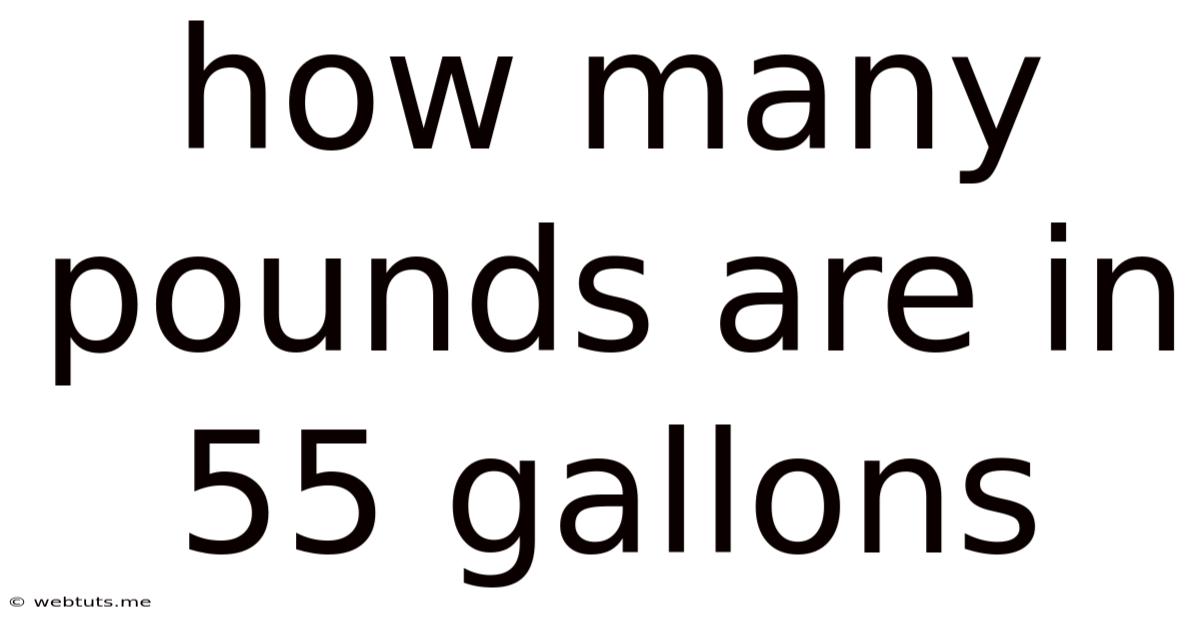How Many Pounds Are In 55 Gallons
Webtuts
May 10, 2025 · 4 min read

Table of Contents
How Many Pounds Are in 55 Gallons? A Comprehensive Guide
Determining the weight of 55 gallons requires understanding that it depends entirely on the substance contained within the 55-gallon container. A 55-gallon drum of water will weigh significantly less than a 55-gallon drum of mercury, for example. This guide will explore the intricacies of this conversion, providing methods for calculation and addressing common misconceptions. We'll delve into various scenarios, helping you accurately determine the weight of 55 gallons of different liquids and materials.
Understanding the Variables: Density and Specific Gravity
The key to converting volume (gallons) to weight (pounds) lies in understanding density. Density is the mass of a substance per unit volume. It's typically expressed in grams per cubic centimeter (g/cm³) or kilograms per liter (kg/L), but we can easily adapt it for our purpose. A closely related concept is specific gravity, which compares the density of a substance to the density of water. Water's density is approximately 8.34 pounds per gallon (lbs/gal).
- High Density: Substances with high density, like mercury or lead, will weigh considerably more per gallon than substances with low density, like air or gasoline.
- Low Density: Substances with low density pack less mass into the same volume, resulting in a lower overall weight.
Understanding these concepts is crucial for accurate calculations. We will use the density or specific gravity of the substance to perform our conversions.
Calculating the Weight of 55 Gallons of Water
Let's start with the most common scenario: calculating the weight of 55 gallons of water. As mentioned, water has a density of approximately 8.34 lbs/gal. Therefore:
Weight = Volume × Density
Weight = 55 gallons × 8.34 lbs/gallon
Weight ≈ 458.7 pounds
So, 55 gallons of pure water weigh approximately 458.7 pounds. However, this is an approximation. The exact weight can vary slightly depending on temperature and purity of the water. Colder water is slightly denser than warmer water.
Factors Affecting the Weight of Water:
- Temperature: Water density changes with temperature. The density we used (8.34 lbs/gal) is an average.
- Purity: Impurities in the water, like dissolved salts or minerals, can slightly alter its density.
- Pressure: At significantly high pressures, water density will increase. However, for most everyday scenarios, this factor is negligible.
Calculating the Weight of 55 Gallons of Other Substances
Now let's expand beyond water. To calculate the weight of 55 gallons of any other substance, you need to know its density or specific gravity.
1. Using Density:
If you know the density (ρ) of the substance in lbs/gal, the calculation remains straightforward:
Weight = Volume × Density
Weight = 55 gallons × ρ (lbs/gal)
2. Using Specific Gravity:
If you only have the specific gravity (SG) of the substance, you can calculate the weight using the following formula:
Weight = Volume × Density of Water × Specific Gravity
Weight = 55 gallons × 8.34 lbs/gal × SG
This formula leverages the known density of water and the relative density of the substance (specific gravity) to determine the weight.
Examples:
Let's consider a few examples:
-
Gasoline: Gasoline has a specific gravity of approximately 0.75. Therefore:
Weight = 55 gallons × 8.34 lbs/gal × 0.75 ≈ 344.8 lbs
-
Motor Oil: Motor oil has a density that varies depending on the type and viscosity, but let's assume a density of around 7.5 lbs/gal for this example:
Weight = 55 gallons × 7.5 lbs/gal ≈ 412.5 lbs
-
Mercury: Mercury is incredibly dense, with a density approximately 13.6 times that of water. Therefore:
Weight = 55 gallons × 8.34 lbs/gal × 13.6 ≈ 6257.84 lbs This is a significantly heavier load!
These are just examples. Always use the most accurate density or specific gravity value available for your specific substance to ensure an accurate calculation.
The Importance of Accurate Measurement and Safety
Accurately determining the weight of 55 gallons of a substance is crucial for various applications, including:
- Transportation: Knowing the weight is essential for proper load planning and to avoid exceeding weight limits on vehicles or vessels.
- Storage: Safe and stable storage requires understanding the weight to prevent structural damage or accidents.
- Material Handling: Appropriate equipment and safety procedures must be used based on the weight of the material being handled.
Safety Precautions:
When handling large volumes of liquids or materials, always prioritize safety:
- Use appropriate personal protective equipment (PPE). This may include gloves, safety glasses, or respirators, depending on the substance.
- Ensure proper ventilation. Some substances release fumes that can be hazardous.
- Follow all relevant safety guidelines and regulations.
Conclusion: Beyond the Simple Calculation
While the basic calculation of weight from volume is relatively simple, the accuracy depends heavily on the substance in question. Remember that the weight of 55 gallons can vary drastically depending on the density of the contained material. Always consult reliable resources for the specific gravity or density of the substance you are working with. Accurate weight determination is not just a mathematical exercise; it's a critical aspect of safety and efficient operations in many fields. By understanding the principles of density and specific gravity, and by taking appropriate safety precautions, you can confidently and accurately determine the weight of 55 gallons of various substances.
Latest Posts
Latest Posts
-
How Many Inches Is 4 2 Cm
May 11, 2025
-
How Many Days Until June 23rd 2024
May 11, 2025
-
How Many Days Until The 9th
May 11, 2025
-
Cuanto Es 180 Libras En Kg
May 11, 2025
-
How Many More Days Until Jan 2
May 11, 2025
Related Post
Thank you for visiting our website which covers about How Many Pounds Are In 55 Gallons . We hope the information provided has been useful to you. Feel free to contact us if you have any questions or need further assistance. See you next time and don't miss to bookmark.